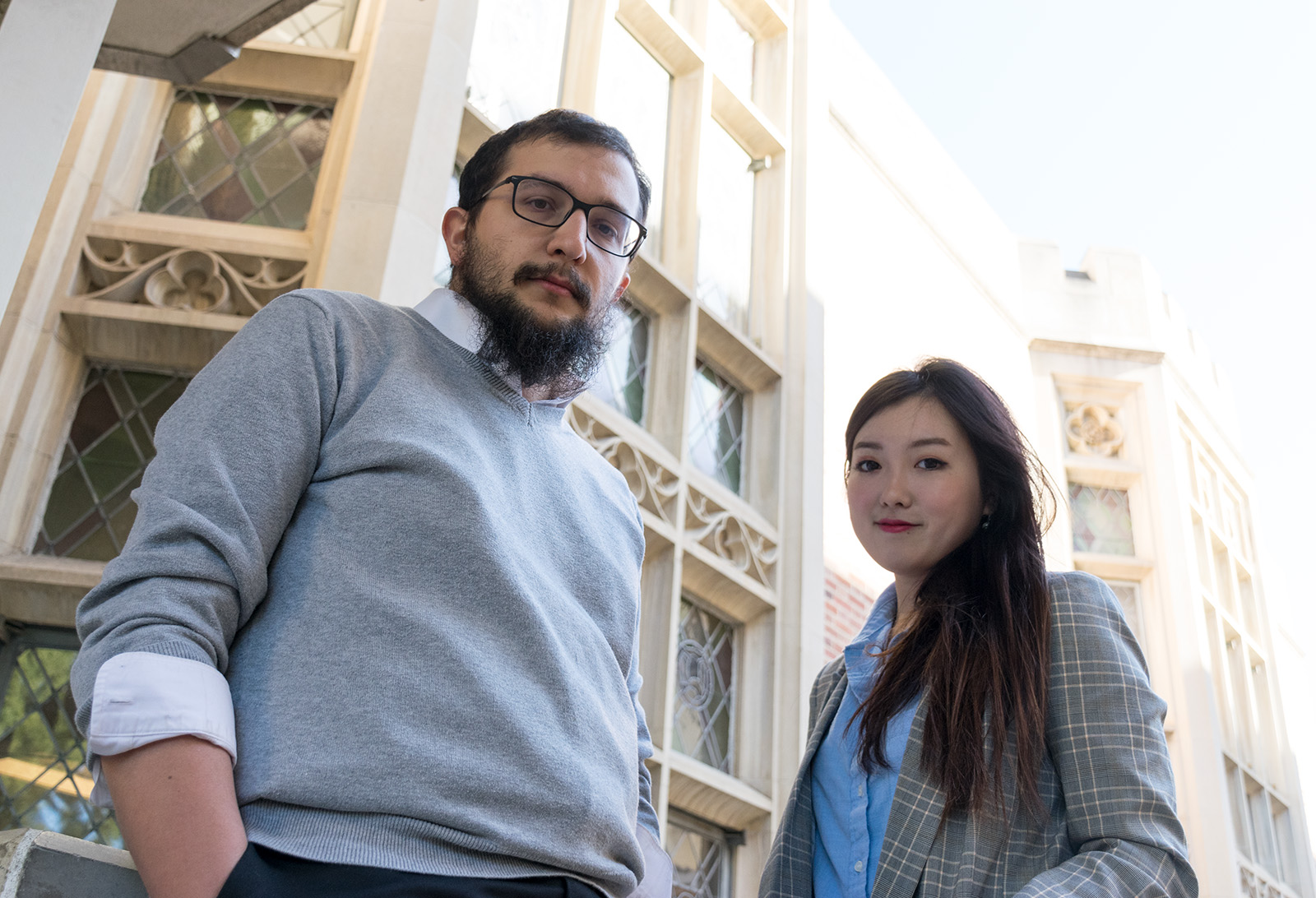Graduate students will make debut in opera composition at workshop

Doctoral candidates in composition Michel Klein and Nicky Sohn each wrote their first operas, which will debut at a workshop reading Friday. Their operas are respectively based on the Biblical story of Abraham and Isaac, and Hans Christian Andersen’s fairy tale, “The Emperor’s New Clothes.” (Farida Saleh/Daily Bruin)
By Haley Tangen
Feb. 26, 2018 11:18 p.m.
“This post was updated Feb. 28 at 2:40 p.m.”
Nicky Sohn wrote an opera last year while traveling across three different countries and attending two music festivals.
“We had a crazy deadline,” Sohn said. “During this time, opera was all there was for me.”
Sohn and Michel Klein, both doctoral candidates in composition, will present their operas, “The Emperor’s New Clothes” and “Akeidah,” respectively, at a workshop reading Thursday, Friday, Saturday and Sunday at the Ostin Music Center. Although Sohn and Klein have both composed music before, the workshop will mark their operatic debuts.
Klein said he approached Peter Kazaras, the director of opera at UCLA, last year and expressed his desire to learn more about opera composition, which he had been interested in for a long time but hadn’t had the chance to pursue.
Although the opera department and the students in the composition program had never collaborated before, Klein said Kazaras wanted to create a new partnership between the two areas of music at UCLA.
Klein’s opera, “Akeidah,” which is Hebrew for “binding,” depicts the biblical story of God calling on Abraham to sacrifice his only son Isaac as a test of Abraham’s faith. Klein came across the story while studying in Jerusalem after finishing his undergraduate studies at Ithaca College.
In the opera, Abraham struggles with the command, but ultimately decides to follow the order before learning that God is testing him and that he does not actually have to go through with the sacrifice.
“I remember reading and learning about the story of Akeidah, the binding of Isaac, and as soon as I read the story I immediately thought this would be a great opera,” Klein said.
He based the storyline for his opera not only on the written text of the Torah, but also on oral rabbinical tradition. Klein said much of the music draws on Jewish prayer melodies.
Klein originally tried to find someone else to write his libretto – the opera’s text – but ultimately decided he could make the opera more personal by writing it himself. He initially struggled writing the lyrics for roles like Abraham’s. However, Klein said he thinks struggling through the creative process allowed him to better relate to Abraham’s obstacles.
Sohn also chose to adapt a traditional story for her opera. Unlike Klein, however, she decided to get help writing the opera’s lyrics and dialogue.
When Sohn first began composing the music for “The Emperor’s New Clothes,” she reached out to the English and theater departments in search of someone to write the opera’s text. At the same time, Amanda Hollander, an alumna and former lecturer in the English department, was looking for a composer to collaborate with and soon began working with Sohn.
The two began working on the storyline and character list for their opera, which closely follows those of Hans Christian Andersen’s original story closely. In the fairytale, two weavers trick a self-absorbed emperor into going out naked before a crowd by telling him they have woven him an invisible garment.
Sohn said writing her first opera differed significantly from composing other types of music, such as ballet, because the libretto was written before Sohn actually began composing the music.
Hollander said she read four different translations of the original fairytale and watched adaptations of other Hans Christian Andersen stories, such as Disney’s “The Little Mermaid.”
In order to modernize the older fairytale and make it feel more relevant, Sohn said she and Hollander decided to make one of the weaver characters a woman named Ramona. In the original Hans Christian Anderson version, all the characters are men.
They also introduced a new character, the Queen. The Queen – who, unlike the rest of the court, recognizes that the emperor’s new clothes are a sham from the start – pays a child to publicly point out the emperor’s nudity. In creating the new character, Hollander said she and Sohn tried to emphasize how women often play key roles in patriarchal structures while still remaining unnoticed.
In the upcoming performance of Sohn’s opera, each character will be played by multiple actors – a tactic Sohn said helps preserve each singer’s voice and adds diversity to the character’s portrayals. For example, the character of Ramona will be performed by a total of three performers.
“Every performance is a different person,” she said. “It’s been so wonderful to hear the different interpretations of the same music I wrote.”


